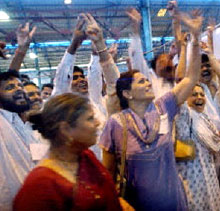|
Vajpayee
Defeated In Elections, Muslims Key Player
 |
|
"Vajpayee's party also adopted Hindu platform which helped alienate the Muslim voters," Khan said
|
Additional
Reporting By Ashraf Allam, IOL Staff
CAIRO/NEW
DELHI, May 13 (IslamOnline.net & News Agencies) - Indian Prime
Minister Atal Behari Vajpayee resigned Thursday, May 13, following a
stunning defeat of his Hindu nationalist-led coalition government in
the elections.
An
Indian analyst told IslamOnline.net that Muslims - estimated at 140
million and making up 13 per cent of India's one billion people
population - have played a key role in the elections.
The
Election Commission said the opposition Congress and its allies had
won 145 seats while the ruling Bharatiya Janata Party (BJP) and
coalition partners picked up 118 of the 333 results declared.
Seventy
other seats were picked by either independents or candidates from
regional parties, the commission was quoted as announcing by Agence
France-Presse (AFP).
Vajpayee's
right-leaning National Democratic Alliance (NDA) said it would sit in
opposition after his resignation.
The
Congress party, led by Sonia Gandhi, the Italian-born heir to India's
most famous political dynasty, said it will ask President Abdul Kalam,
the ceremonial head of state, to allow the party to form the new
government.
"A
non-NDA secular coalition led by the Congress should take oath in the
next few days," Congress spokeswoman Ambika Soni said.
Congress
has been working to cement alliances with the Communist Party of
India-Marxist, and with smaller regional parties, particularly in the
most populous state, Uttar Pradesh, which sends 80 MPs to New Delhi.
Decisive
Muslim Votes
The
BJP, which has led coalitions since 1998 as the first avowedly Hindu
party to rule secular India, called the election five months ahead of
schedule to capitalize on 79-year-old Vajpayee's popularity and
surging economic growth.
Muslims
played a decisive role in the downfall of BJP, which long has the tag
of being anti-Muslim, Zafarul-Islam Khan, an Indian expert, told
IslamOnline.net over phone from New Delhi.
At
the start of the elections on April 20, most surveys forecast a clean
sweep for the BJP and its partners.
But
on April 26, the third and the possibly decisive round of India’s
general elections began with voting in 11 states with large Muslim
populations.
"Muslims
have feared that the ruling party could woo Hindu extremists and build
a temple in place of the Babri
mosque destroyed in the northern Indian town of
Ayodhya," he said.
The
16th-century mosque was destroyed in 1992 by thousands of Hindu
zealots in a campaign led by Vajpayee's ruling BJP party.
"Vajpayee's
party also adopted Hindu platform which helped alienate the Muslim
voters," Khan said.
The
destruction of the mosque had acted as a magic touch for the ruling
party which only that hand only two parliamentary seats before the
mosque destruction, he added.
Vajpayee
faced demands of resignation from opposition parties in the Parliament
in July 2003 over accusations of protecting cabinet colleagues
involved in the 1992 demolition of the mosque.
Khan
said the ruling party failed to build a Hindu temple in the mosque
place since coming to power five and a half years ago, due to the
country's strong and independent laws.
"It
also failed to end the autonomy of the predominately-Muslim Kashmir,
or the special status of Muslims and Christians," added the
expert.
"This
all pushed Muslims to vote for the Congress Party, although all
parties were wooing Muslim voters including Vajpayee's BJP," Khan
said.
Just
two years ago, human rights groups and the opposition accused the
ruling party of turning a blind eye to riots in western Gujarat state
in which at least 2,000 people, mostly Muslims, were killed.
Support
Base
 |
|
Congress Party supporters celebrate as they monitor progressive voting results in the north constituency of Bombay (AFP)
|
On
the other hand, the Congress Party has a Muslim support base, with its
leaders seeking to position it as a party of the mainstream.
A
winning Congress party said Thursday it was committed to the ongoing
peace process with nuclear rival Pakistan over the Muslim-majority
Kashmir.
"The
Congress is committed to working towards creating lasting peace in the
region," Congress spokesman Anand Sharma told AFP.
The
comments came after Pakistan expressed hope that the defeat of
Vajpayee's ruling party would not affect the peace process between the
South Asian rivals.
"Relations
with Pakistan did not play a key role in elections, as the two parties
seek good relations with the neighboring country in a away that does
not incite armed groups in Kashmir," Khan said.
More
than 370 million people voted in the national election, held on five
dates from April 20 in nearly 687,500 voting stations.
|